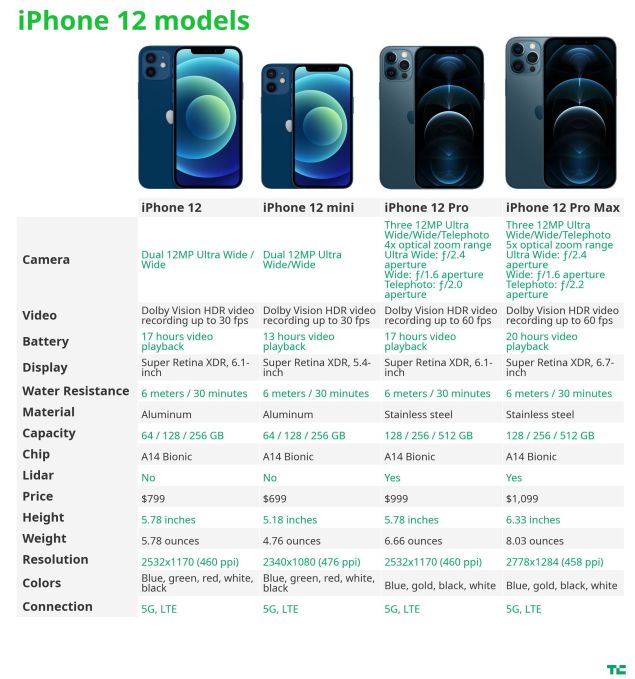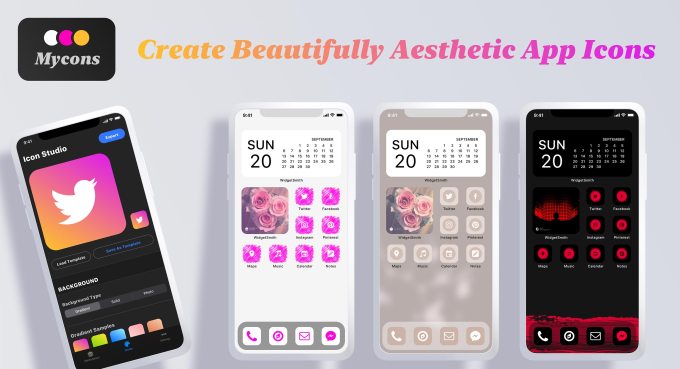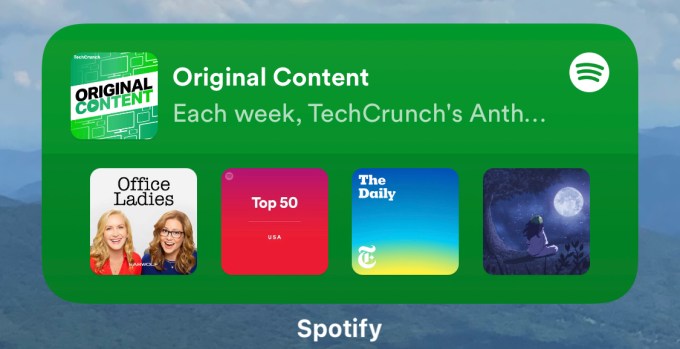Welcome back to This Week in Apps, the TechCrunch series that recaps the latest OS news, the applications they support and the money that flows through it all.
The app industry is as hot as ever, with a record 204 billion downloads and $120 billion in consumer spending in 2019. People are now spending three hours and 40 minutes per day using apps, rivaling TV. Apps aren’t just a way to pass idle hours — they’re a big business. In 2019, mobile-first companies had a combined $544 billion valuation, 6.5x higher than those without a mobile focus.
In this series, we help you keep up with the latest news from the world of apps, delivered on a weekly basis.
Apple introduces four new iPhones (and more)
Apple hosted its iPhone event this week, where it introduced the new iPhone 12… and the iPhone 12 mini, the iPhone 12 Pro and the iPhone 12 Pro Max — effectively plugging all the holes in the market. With the release of the four new iPhones, app developers will have a range of devices to build for, from small to very large — the 12 Pro Max, for example, introduces the iPhone’s biggest-ever screen and the highest resolution, at nearly 3.5M pixels.
It also, of course, includes serious camera improvements, from a redesign of the three-lens system to including a new deeper telephoto camera, now a 65 mm-equivalent instead of 52 mm, as on previous models. There’s also an improved wide-angle lens, larger sensor, the addition of sensor-level image stabilization and a revamped Night Mode. Photographers will appreciate the new Apple ProRAW format, as well. (More on that here).
The iPhone 12 mini, meanwhile, aims to serve the customer base that prefers a smaller phone, like the iPhone SE, but without sacrificing functionality.

All the devices share some key features, including 5G connectivity, the new MagSafe connector for wireless charging and snap-on magnetic accessories, OLED displays and the A14 chip. They also have a more classic look, with straight edges that allow for additional antennas, providing next-gen wireless connectivity.
One of the bigger differences, however, between the Pro models and the regular iPhone 12 is the addition of the LiDAR Scanner, which is also found in the latest iPad Pro. The scanner measures how long it takes for light to reach an object and reflect back. The new depth-sensing technology has big implications for AR, as it allows augmented reality objects to interact with objects in the real world. AR apps will be more user-friendly, too, as they won’t need to first scan the room to place the AR object in the real world. It can be placed instantly.
Apple is leveraging the sensor for the iPhone 12 Pro camera to offer up to 6x faster focus in low-light conditions. Developers, meanwhile, can leverage lidar for use cases like AR-enabled games that work in the real world, social media (like Snapchat’s new lidar-powered Lens), home design and improvement apps involving room scans, spatial layout planning (like JigSpace), better AR shopping experiences and more.
The company also announced an affordable version of its HomePod smart speaker, the $99 HomePod Mini. The item works best for those fully locked inside the Apple universe, as it will stream a handful of music services, but not one of the most popular — Spotify. However, Apple also introduced a nifty feature for the HomePod devices, Intercom, which lets you send announcements across the speakers. While Apple and Google have offered a similar feature for their smart speakers, Intercom also works across other Apple devices, including iPhone, iPod, AirPods and even CarPlay. (What, no Mac?)
If Apple isn’t too late to capture smart speaker market share, the new speaker could see more users adopting smart home devices they can voice control through the HomePod Mini.
During the event, Apple also subtly snubbed its nose at Epic’s Fortnite with the announcement that
League of Legends: Wild Rift would be coming to iPhone 12 to take advantage of its new 5G capabilities and A14 Bionic chip.
Platforms
- Lidar comes to iPhone 12 Pro. Developers can now build AR experiences that interact with real-world objects, and AR apps can now instantly place AR objects in the real world without scanning the room. The update will mean a huge increase in the usability of AR apps but is limited to the Pro model of iPhone for now. Snapchat is already using it.
- Apple developers can now make their apps available for pre-order even earlier — up to 180 days before release on the App Store.
- Android Studio 4.1 launches. The new, stable version of the IDE for building Android apps introduces better TensorFlow Lite support and a new database inspector. The team also fixed a whopping 2,370 bugs during this release cycle and closed 275 public issues.
- Google introduces the Android for Cars library. The library, now in open beta, gives developers tools to design, develop and test new navigation, parking or charging apps for Android Auto. The Google Play Store will be enabled for publishing beta apps in the “coming months.”
- Google stops selling music. The company no longer sells tracks and albums on its Play Store, shifting all its focus to YouTube Music. The latter also just launched on Apple Watch this week.
Trends
- Shopping apps forecast. U.S. consumers were expected to spend 60M hours in Android shopping apps during Prime Day week, (which just wrapped) according to one forecast from App Annie.
- Prime Day downloads grow. Sensor Tower estimates global installs of the Amazon app grew 23% year-over-year, to 684K, as Prime Day neared. Installs on Wednesday were up 33% to 750K. However, U.S. installs were down by 22% 10/13-10/14. Apptopia noted that app sessions, however, were up 27% year-over-year.
- Shopping, Food & Drink app launches up more than 50% year-over-year. Shopping apps grew 52% while Food & Drink apps grew 60%, due to COVID-19 impacts, according to Sensor Tower.
- Subscriptions. U.S. consumers spend $20.78 per month on app subscriptions, Adjust study says.
- TikTok sale impact on ad industry. 73% of marketers said a TikTok sale in the U.S. would impact their 2021 advertising plans. 41% also believed the deal could allow Walmart to overtake Amazon in e-commerce.
- Amazon expands AR experimentation to its boxes. The retailer launched a new AR application that works with QR codes on the company’s shipping boxes to create “interactive, shareable” AR experiences, like a pumpkin that comes to life.
Security
- Robinhood said a “limited number” of its users’ accounts were hacked. The service itself was not hacked, but around 2,000 customers had accounts compromised by cybercriminals who first compromised users’ personal emails outside the trading app.
Other News
- Zoom’s new events platform brings apps to video conferencing calls.
- Messenger update brings new features, including cross-app communication with Instagram. The app gets fun features like chat themes, custom reactions and, soon, selfie stickers and vanish mode. But the bigger news is the (potentially anti-competitive) merging of Facebook’s chat platforms.
- Life360 leverages TikTok teens’ complaints to start a dialogue and invent a new feature, “Bubbles,” which allows teens (or anyone) to share a generalized location instead of an exact one. The feature gives teens a bit more freedom to roam and make choices without so much parental oversight. Parents, meanwhile, can still be sure their teen is OK, as features like emergency SOS and crash alerts remain functional.
- Must-read: The MacStories iOS and iPadOS 14 Review. Federico Viticci offers a 23-page deep dive into the latest version of Apple’s mobile operating system.
-
- Future raises $24M Series B for its $150/mo workout coaching app amid at-home fitness boom. The app pairs users with real-life fitness coaching for personal training at home. The round was led by Trustbridge Partners with Caffeinated Capital and Series A investors Kleiner Perkins participating.
- River raises $10.4M for its app offering news, events and other happenings from around the web, ranging from news stories from top publishers to sports to even notable tweets. The app presents the information in a real-time stream, browsed vertically. There’s also a “For You” page, similar to TikTok.
- Roblox confidentially filed with the SEC to go public. This cross-platform gaming platform has boomed during coronavirus lockdowns. According to reports, the listing could double Robox’s $4B valuation.
- Robo Adviser Wealthsimple raises $87M. The funding for the investing app with comparisons to Robinhood was led by Menlo Park-based Technology Crossover Ventures (TCV), valuing the business at $1B.
- Fitness platform Playbook raises $9.3M. The company offers tools for personal trainers who want to make their own videos, which consumers then browse in Playbook’s mobile app. Backers include E.ventures, Michael Ovitz, Abstract, Algae Ventures, Porsche Ventures and FJ Labs.
- Live streaming app Moment House raises $1.5M seed. The startup aims to recreate live events in a digital format. LA area investors invested, including Scooter Braun, Troy Carter, Kygo’s Palm Tree Crew and Jared Leto. Patreon chief executive Jack Conte and Sequoia Capital partner Jess Lee also participated.
- Twilio acquires Segment for $3.2B to help developers build data-fueled apps.
- E-learning platform Kahoot raises $215M from SoftBank. The Norwegian startup claims to have hosted 1.3 billion “participating players” in the last 12 months. The company’s gamified e-learning platform is used both in schools and in enterprise environments.
Mycons

Mycons is a new app that makes it easier for users, including non-designers, to create and buy custom icons for their iOS home screen makeovers. In the app’s “Icon Studio,” users can create icons by swapping out the background, choosing a symbol and placing it on the icon accordingly. You can also create a whole set of icons in a batch export. If you don’t feel like designing your own, you can opt to purchase premade packs instead.
The app is a free download with a one-time, in-app purchase to unlock the fully functionality of the icon designer. The icon packs, which include different variations and matching wallpaper, range from $7.99-$9.99.
Spotify’s new iOS 14 widget

Image Credits: TechCrunch screenshot of Spotify widget
It’s here! The widget a number of people have waited for since the launch of the new version of iOS has arrived.
The widget, which arrives in the latest version of the Spotify iOS app, comes in two sizes. The smaller widget will display just your most recently listened to item, while the medium-sized widget will instead show the five most recent items — four in a horizontal row and the most recent at the top. In that case, you can actually tap on the small thumbnail for which of the five you want to now stream to be taken directly to that page in the Spotify app. The widget also automatically updates its background color to match the thumbnail photo.




